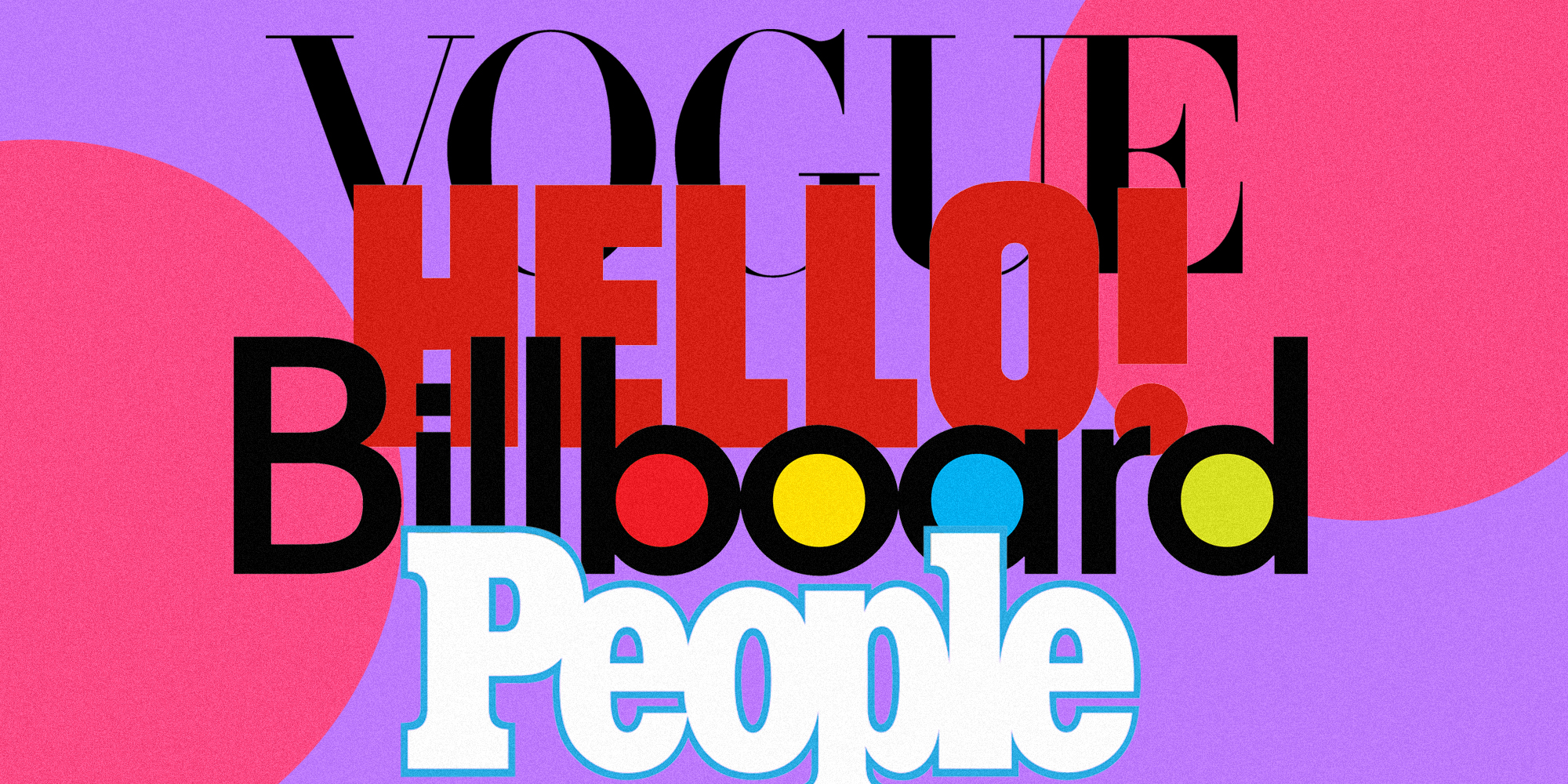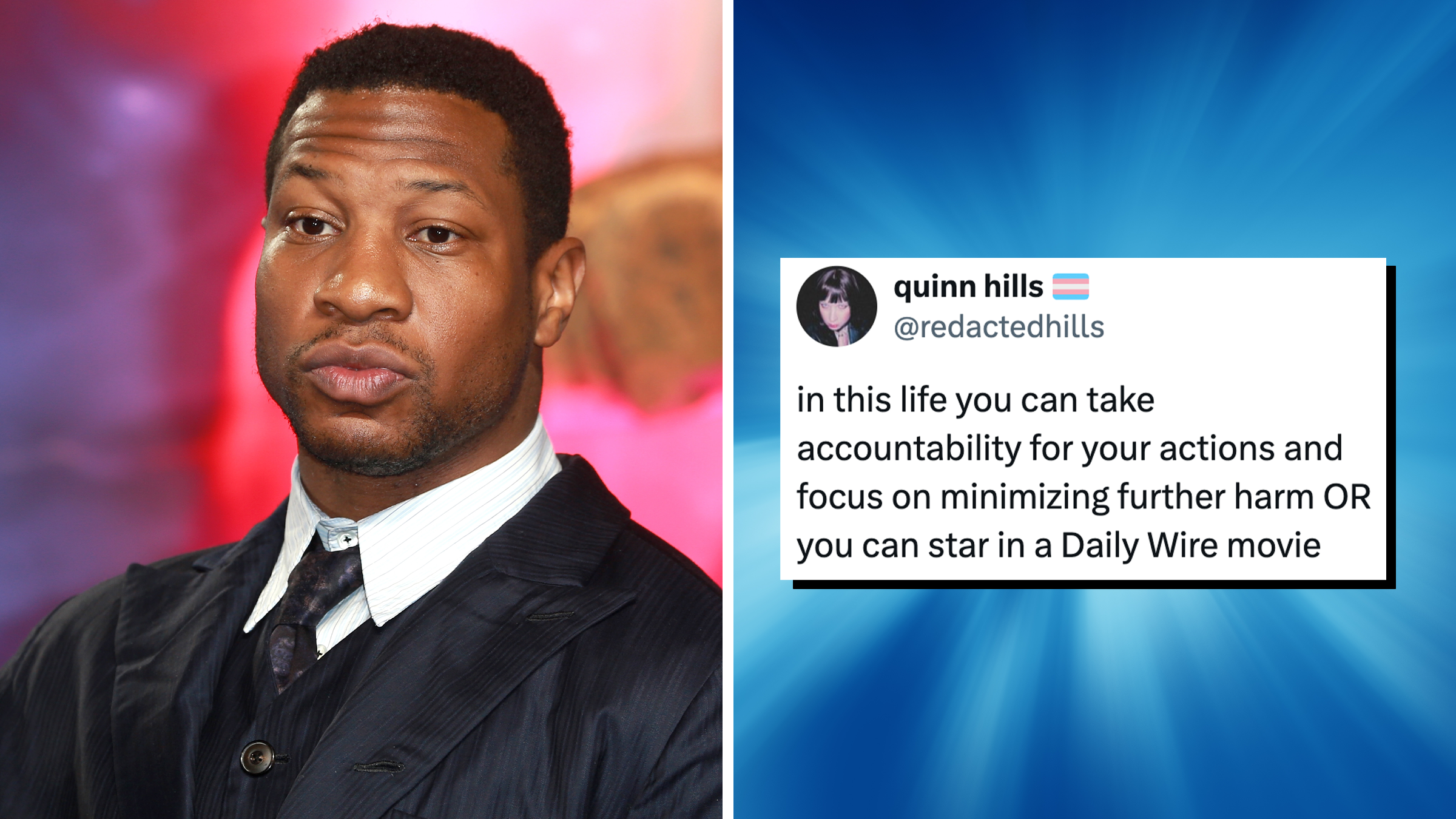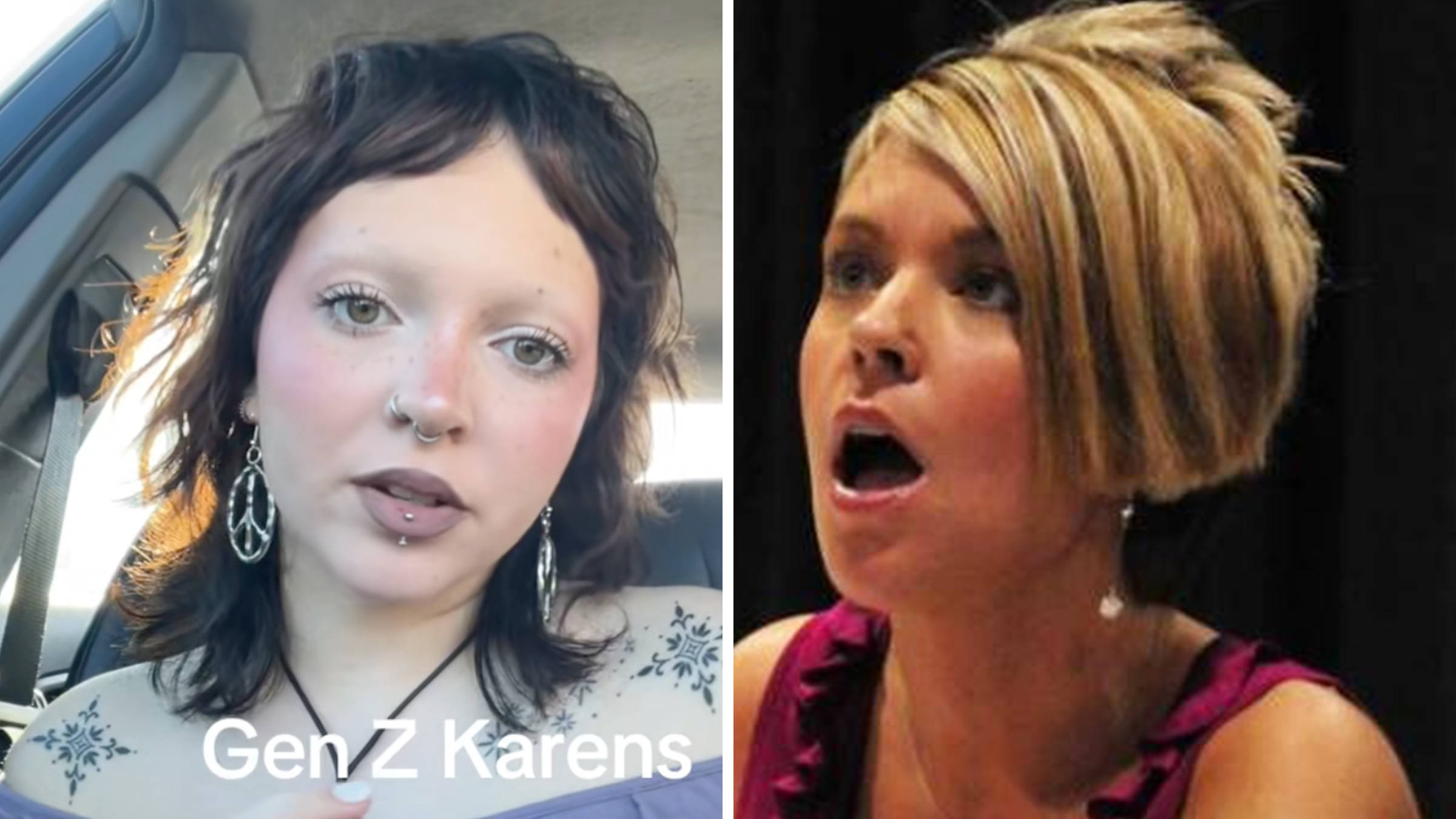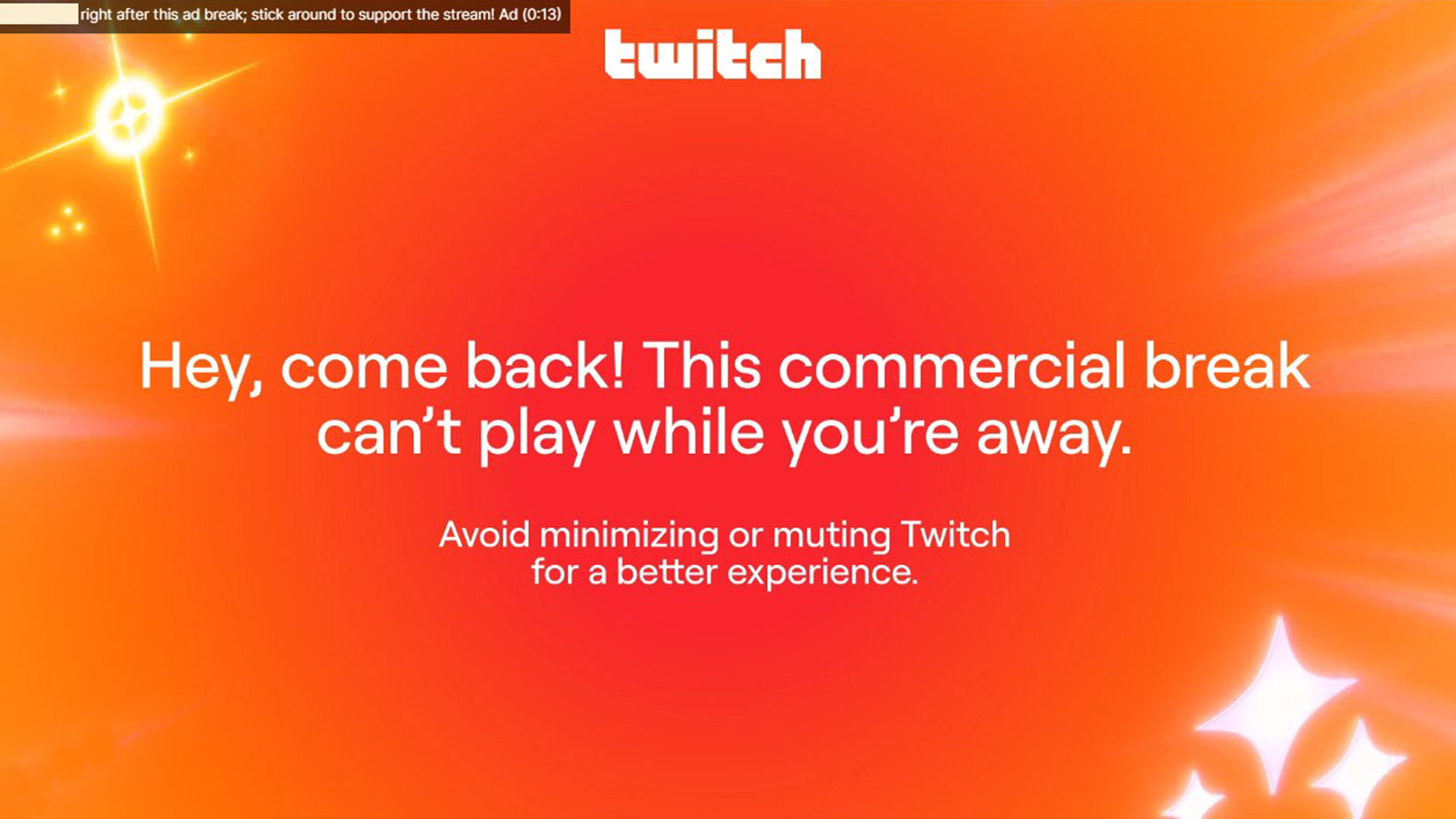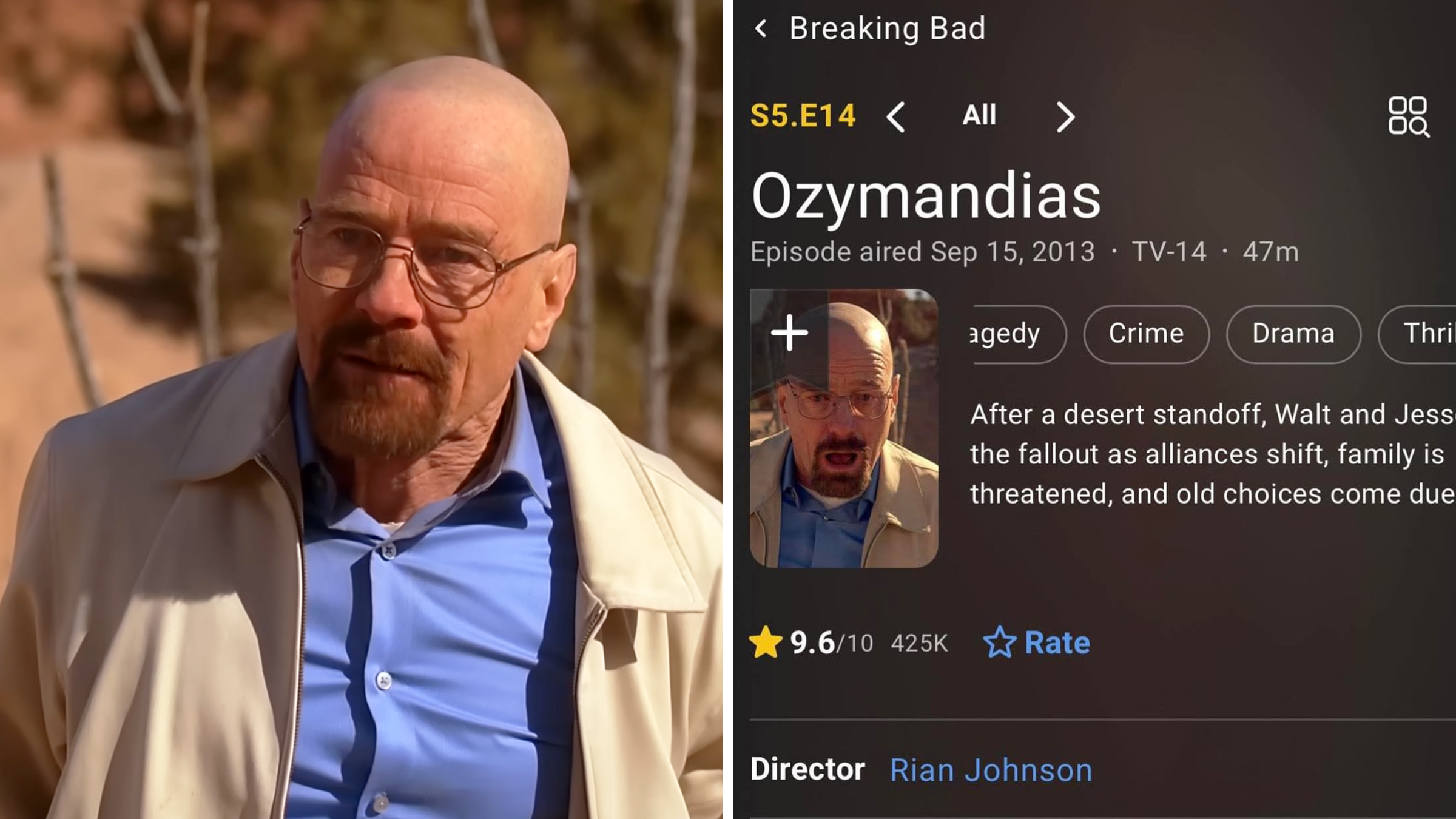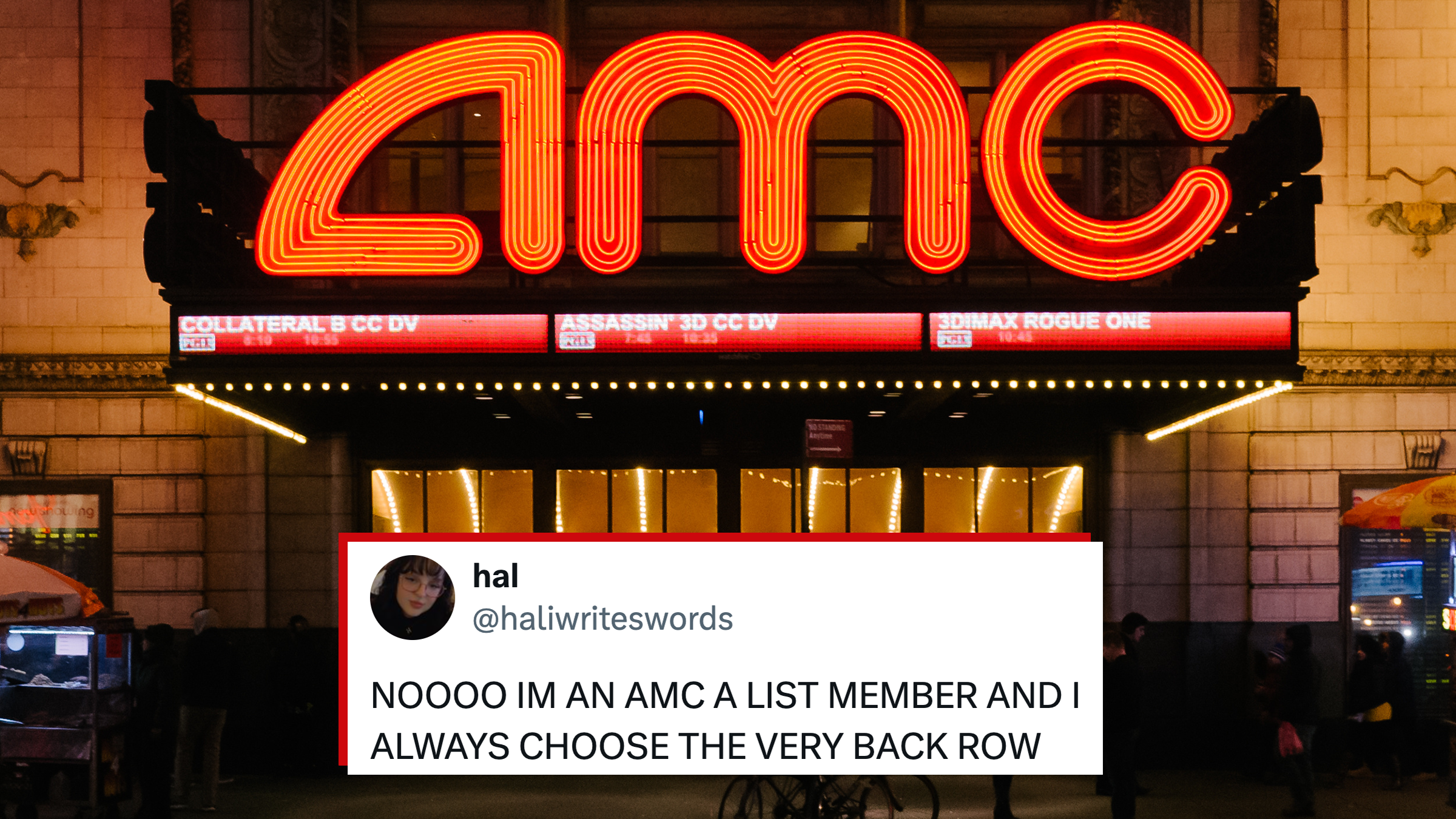Update: In the aftermath of Daily Dot's reporting, Meta removed nearly all social media accounts belonging to the publishers accused of impersonating international media companies. This story has been covered by several English-language Pakistani publishers, including ProPakistani, TechJuice, and Pakistan Observer. Follow-up stories have indicated that the Daily Dot's website has once again been blocked by specific internet service providers at the behest of the largest media agencies in the country. Many say the story has called into question due diligence and media planning processes at Pakistani media
agencies, which are either owned by foreign entities or have affiliations with them. Local reporting also indicates that advertisers and agencies across Pakistan are cancelling purchase orders or demanding refunds from FHM Pakistan, Runway Advertising, and Zahraa Assad Saifullah.
At first glance, Vogue Pakistan’s Instagram account looks legitimate. It has 1 million followers and its feed is crammed with celebrities, models, high fashion, and luxury brands. Its bio says it’s the “official Instagram” of Vogue Pakistan.
The first clue that something isn’t quite right with the account is the fact that it isn’t verified. Scroll through the feed and you’ll notice that it posts luxury watches every few days. The page is littered with pictures of timepieces by Louis Erard, ArtyA, Ferragamo, Graham Watchmakers that tag Hanif Jewellers, which seems a bit odd compared to content shared by other editions of Vogue online. This gives the impression that these are sponsored posts, although none appear to acknowledge this. The Instagram for the original Vogue does not appear to do sponsored posts.
Dig further, and you may conclude that, in spite of the name and description, Vogue Pakistan is not actually part of the Vogue brand. Some of its posts deviate wildly from the focus and aesthetic of the fashion and lifestyle magazine that has a global footprint and 133-year history. It’s also telling that Vogue parent company Conde Nast’s website does not list a Pakistan edition of Vogue or any of its other publications, for that matter.
Vogue Pakistan is run by FHM Pakistan Publications. Sources say that FHM is doing so without authorization.
This isn’t the only American media company FHM is running a Pakistani version of; the group is behind People Magazine Pakistan. Nor is FHM the only company using storied media companies’ names to run foreign editions online. Others are running purportedly fake publications that have huge followings on social media, as well as on websites that a casual observer may assume are legitimate. Examples include Runway, Billboard, Hello!, and Grazia. It’s a global phenomenon with potentially huge financial and reputational implications. Some blame Pakistan itself for failing to protect intellectual property. Others point the finger at the platforms. The social media companies that host the apparently fake accounts appear to be either unaware or unconcerned. The companies behind them are on other platforms, but Facebook and Instagram appear to provide them with the greatest reach. There are multiple Instagram accounts that purport to be Vogue Pakistan.
FHM, Conde Nast, and People parent company Dotdash Meredith did not respond to emailed inquiries. After being contacted by the Daily Dot, Instagram and Facebook parent company Meta insisted it takes the issue seriously and will remove any accounts that violate its policies.
A day after the Daily Dot contacted Conde Nast for comment, the Vogue Pakistan Instagram account was taken down.
People and Vogue Pakistan
Meta’s rules prohibit copyright infringement and claim the company is “committed” to protecting intellectual property rights. Via email, Meta confirmed that impersonation violates its community standards and that it prohibits deceptive and misleading ads. The company stressed that intellectual property rights holders have multiple means of reporting potential rights violations on its platform.
Meta said it had removed 1.1 billion fake accounts on Facebook alone, and that it found 99.7% of those accounts on its own via artificial intelligence (AI). It also said that it blocks millions of accounts when they're created, and described the space as adversarial and full of bad actors, further noting that it encourages users to report policy violations.
Yet Vogue Pakistan was first called out as a fake four years ago. At the time, a Pakistani publication reported that the now-defunct domain voguepakistan.online was registered to FHM Pakistan Publications and that the Securities & Exchange Commission of Pakistan’s database stated it was owned by Faisal Shahjahan and Adnan Faisal. A recent search of the database did not find any record of either the URL or FHM Pakistan Publications.
At the time, representatives from Conde Nast reportedly said that FHM was not authorized to use the Vogue brand. According to the outlet, FHM took down both the Facebook and Instagram pages for Vogue Pakistan after a reporter contacted it.
Now, Vogue Pakistan is back and churning out posts to its million Instagram followers. The account launched in November 2023.
FHM once again appears to be behind the largest of several Vogue Pakistan accounts on Instagram. A February post urged people to buy land in the Metaverse by emailing metaverse@fhmpakistan.com.
Some of the content would likely convince even someone familiar with the original Vogue that it’s legitimate. The first post on the page shows a collection of Vogue magazines. In May, Vogue Pakistan posted a photo of actress Courtney Cox with her former Friends co-star Matthew Perry, who died last year. The post reads as if it is a snippet from an exclusive interview with Cox, who it claims said she “fondly recalls their time together and mentioned that he often visits her in spirit.” The post includes the hashtag #VogueDigital.
Vogue Pakistan’s Instagram often accompanies posts with the #VogueDigital hashtag, which Vogue uses, signaling it’s following the global standards of the American fashion and lifestyle magazine.
“Hi, this is Imran Abbas, and I’m very excited that Vogue is coming to Pakistan,” says the Pakistani actor in an Instagram post on Vogue Pakistan, on the set of the Adnan Faisal Podcast, wearing the same attire from his appearance on the program.
Some of the page’s content is arguably bizarre for a brand focused on high-end fashion, celebrities, and luxury products. Two posts from Sept. 13 promote power plants in a province in Pakistan. One boasts that the region is “[l]eading the way in mining with the Thar coal power plant.”
That day Vogue Pakistan posted the purported cover of that month’s issue of its magazine. A few weeks later, it posted an interview with the actress that appeared on the cover. This signals that the brand is functioning as if it is legitimate, with professional videographers, photographers, and editors. Sources say it even has a print version.
They also say it’s generating revenue via sponsored posts. Meta insists it removes ads that violate its policies.
The first post that seems likely to have been sponsored touts Spotify’s 2023 Wrapped. The ad was placed on behalf of Spotify MENA FZ-LLC, a client of IG Square Pakistan, which is affiliated with American advertising company the Interpublic Group of Companies.
The second sponsored post is from Beijing Xiaomi Mobile Software, which is a client of GroupM Pakistan, owned by British multinational communications, advertising, public relations, technology, and commerce holding company WPP.
The third sponsored post is from Dany Technologies House, for their Zero Lifestyle brand, which is a client of Conglo. The latest sponsored post is from Bank Alfalah, a client of Grayling affiliated Media Pulse.
The majority of seemingly sponsored posts in recent months tag Hanif Jeweller, which sells luxury watches. In July, it posted what looks to be an ad for a fast-casual restaurant in Pakistan.
FHM has also been even more successful online with People Magazine Pakistan, which also appears to be unauthorized. Its Facebook page is verified and has over 1 million followers and likes apiece. The Instagram page is also verified and has 2 million followers; the platform shows that it’s posted nearly 44,000 times. Some of its posts appear to be ads, such as one for a new store in a mall in Lahore, Pakistan.
It may seem odd to some who visit the 8-year-old People Magazine Pakistan Facebook page that a brand like People would use a Gmail account as its email address. It’s also not keeping with the brand to use WordPress as the platform for its website. Further, People parent company Dotdash Meredith only lists two editions of the publication: the flagship publication and People en Espanol.
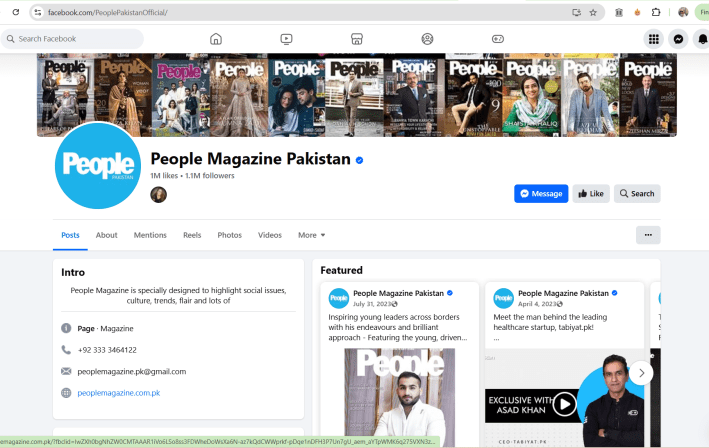
Another much smaller Facebook page also purports to be the Pakistani version of People, likely without the company’s permission. The most recent post on the site is time-stamped 2021 and it does not include .pk, the country code for Pakistan.
It’s unknown whether either Conde Nast or Dotdash Meredith have licensing agreements with FHM or any other companies to operate Pakistani versions of their publications.
Other international publications
In the same vein, a Pakistani company called Runway Advertising Pakistan has also produced Pakistani editions of Runway magazine and Billboard magazine. Both are run by Mashal Amir Ali. The Billboard account was shut down after the Daily Dot sent an inquiry about whether it violated Meta's policies.
Runway is an international fashion magazine founded in the U.S. that today is headquartered in France. Its website does not list a Pakistani version of the publication.
Runway Pakistan’s Instagram account is verified and has 1.4 million followers. The Facebook page, which has nearly 200,000 followers, is not verified. Its unverified TikTok account has a few thousand followers and it also operates a website where it appears to post articles a few times a month. The site’s address does not include the Pakistani country code.
Hello! is a nearly 40-year-old weekly magazine specializing in celebrity news and human-interest stories. Grazia is a weekly women's magazine that originated in Italy. As evidenced from both magazines’ sites, neither has a publication in Pakistan.
Yet Zahraa Assad Saifullah has spent the better part of a decade claiming to represent both in Pakistan under Hello Pakistan and Grazia Pakistan, reportedly using the brand guidelines to the letter.
“In 2012, Zahraa brought Hello! franchise to Pakistan which has been a game-changer in fashion, lifestyle, celebrity and society portrayal and promotion in Pakistan,” says the Hello Pakistan website’s about page. “In 2017, she brought Grazia, an international fashion magazine, to Pakistan which reaches out to a younger demographic, especially because of its fashion related content.”
Industry sources within Pakistan shared that while this may have been true at one point, the franchise rights expired many years ago. They say Saifullah nevertheless continues to claim a right to represent these media brands due to the demand of sponsored posts from clients of international media agencies.
Saifullah did not respond to an emailed inquiry.
Why it matters
It’s one thing to use online tools to prank friends and family about being on the cover of Vogue. It’s another to publish foreign editions of a magazine, launch what appears to be an international franchise of it, and sell ads on the strength of its brand.
Areeba Siddiqui, chief operating officer of FHM Pakistan, shared a media kit for all FHM Pakistan publications, showing a sales-first approach toward editorial decisions.
“We work exclusively with the leading agencies in Pakistan, all of whom prioritize our publication for their key rollouts,” said Siddiqui. “We cannot share the exact calendar however it has a 30-day window between each edition. We only focus on targeted digital marketing.”
Some may say this strategy may undermine the credibility of the foreign media brands.
The business is charging upward of $2,500 for advertisers, agencies, and celebrity talent agencies to feature products, clients, and more across its various print, digital, and video formats.
The reputations of the companies whose products are featured on the pages of fake brands may also be negatively affected. For example, a company that makes watches that cost thousands of dollars may not want its brand to appear alongside ads for fast-casual restaurants or powerplants.
FHM’s Adnan Faisal, Runway Advertising’s Mashal Amir Ali, Zahraa Assad Saifullah of the Pakistani versions of Billboard and Hello!, and the heads of multiple advertising agencies that place ads in these publications declined to comment on their involvement in these activities. After the Daily Dot sent inquiries to Meta, Billboard Pakistan and People Magazine Pakistan Instagram accounts were shut down.
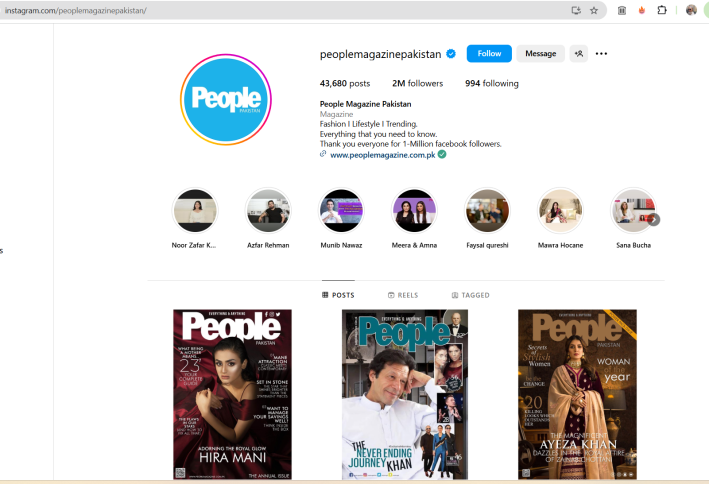
Some blame Pakistan itself for failing to protect the intellectual property of foreign companies. Last year, the Daily Dot reported on rampant distribution of American media content in the country that appeared to be occurring on a mass scale without authorization.
Zeeshan Jaffri, a social activist and communication analyst, told the Daily Dot that the effective implementation of intellectual property rights in Pakistan is one of the biggest concerns of foreign investors.
Meanwhile, the nation continues to approach the West for loans, aid, handouts, reparations, and climate justice funds—all extracted from the Western taxpayer.
“Pakistan needs to improve security by implementing intellectual property laws that protect foreign companies and attract international investors,” said Jaffri.
"The government is trying to improve the security situation and create a one-window SIFC forum to facilitate investors, but it still lacks focus on the underlying but equally important issues, like the continued violation of foreign companies’ intellectual property rights in Pakistan.”
Claire Goforth contributed to this story.
Send Hi-Res story tips and suggestions here.
The internet is chaotic—but we’ll break it down for you in one daily email. Sign up for the Daily Dot’s web_crawlr newsletter here to get the best (and worst) of the internet straight into your inbox.
